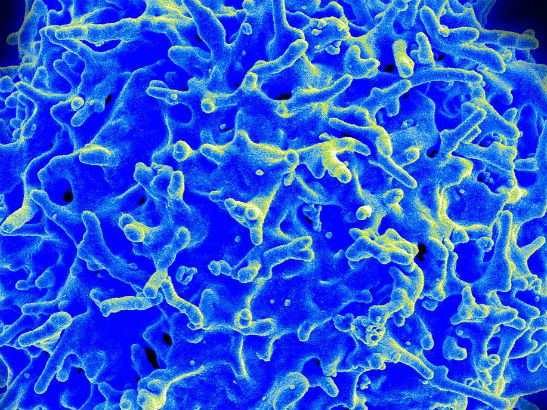
Colourised scanning electron micrograph of a T lymphocyte. Credit: NIAID CC-BY 2.0
The state of the immune system in the area around a biliary tract cancer tumour may be a good indicator of whether the cancer is likely to return following surgery, researchers have found.
By testing samples from tumours and the surrounding tissues – including the immune cells that gather round a cancer – the research team found many immune system genes that, when either over or under-expressed, were linked to a higher risk of the cancer recurring.
More of these deregulated genes were found in samples from the surrounding tissue than in the tumour itself – suggesting that the environment around the tumour plays an important role in the development and progression of the disease.
The research was carried out by a European consortium led by The Institute of Cancer Research, and including Switzerland's Institute of Oncology Research, the Humanitas Cancer Centre in Milan, and the University of Padova.
Immune system affects treatment response
The biliary tract is a system of channels and ducts that carry bile from the liver to the small intestine, where it helps to digest fats.
Currently, less than 50% of biliary tract cancer patients who have had their tumour removed live for more than five years.
Writing in the European Journal of Cancer, the researchers explained that understanding the expression of immune system genes in surrounding tissues gives an indication of how well the immune system is working, and could lead to find a way to identify which patients have a worse prognosis.
The study, which received support from a range of funders – including the ICR, and the NIHR Biomedical Research Centre at The Royal Marsden NHS Foundation Trust and the ICR – could lead to the development of a test that indicates of how likely an individual’s cancer is to return.
This could ultimately help doctors determine who is most at risk, and give them the best possible treatment.
Longer time to relapse
The research team found that patients with a high expression of the gene CTLA4 from in the region around their tumours were more likely than other patients to see their cancer recur.
The gene codes for a protein, CTLA4, that is found on the surface of a type of immune cell that inhibits the immune system.
Looking deeper, the team found that levels of a protein called CD80, which works in conjunction with CTLA4, could be used to determine who would have the most benefit from chemotherapy.
Patients with high CD80 levels in the region surrounding their tumour relapsed around 16 months after chemotherapy, compared to around 29 months for those with low CD80 levels.
Your support for out Liver Cancer Appeal can help us fight an often overlooked form of cancer, one that claims an increasingly large number of lives every year.
Marker could guide treatment decisions
Dr Chiara Braconi, Clinician Scientist at the ICR and Consultant Medical Oncologist at The Royal Marsden, led the research. She said:
“Biliary tract cancer is a challenging disease to treat, with the patient’s immune response playing a large part in how well they respond to treatment.
“Our research suggests that tests that measure the activity of immune-related genes, and their products, could help predict which patients will get the most benefit from chemotherapy after surgery. In the future, this sort of test could guide doctors’ treatment decisions for these patients.
“CD80 in particular could be a promising marker of sensitivity to chemotherapy, and merits further research in larger groups of patients.”
